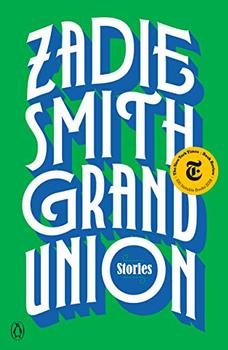Summary | Excerpt | Reviews | Beyond the Book | Read-Alikes | Genres & Themes | Author Bio

Stories
by Zadie SmithThis article relates to Grand Union
 In Zadie Smith's story "Downtown," characters mourn the closing of Café Loup. The West Village restaurant and bar, founded in 1977, had become a beloved institution to its loyal patrons when it was suddenly seized in September 2018 for over $100,000 in unpaid taxes. The tributes poured in immediately, as did the accounts of the spot's literary history.
In Zadie Smith's story "Downtown," characters mourn the closing of Café Loup. The West Village restaurant and bar, founded in 1977, had become a beloved institution to its loyal patrons when it was suddenly seized in September 2018 for over $100,000 in unpaid taxes. The tributes poured in immediately, as did the accounts of the spot's literary history.
Writer Sadie Stein penned an impassioned article of appreciation for Café Loup in the New Yorker. "No one went there for the food," she writes, an unusual assertion about a restaurant. The café, everyone agrees, was not just about community, but about being free to establish connections at a leisurely pace, or just quietly read a book if you didn't want to chat. Most of the staff had been there for years, and could often be observed sharing gossip with customers.
A 2012 New York Times review of the restaurant also doesn't go into detail about the food, with the exception of the french fries. And yet, it's a positive write-up, focusing on genial overheard conversation, friendly service and bartenders who went the extra mile. Café Loup was also mentioned in a 2007 New York Times piece that praised the wall art and the food: "Let your eyes wander around the room: the walls are covered with crisply framed photographs by Berenice Abbott, Brassaï and Irving Penn, lending the restaurant a salon-like flair. So does the food: try the salad lyonnaise with Belgian endives ($12), followed by the hanger steak frites ($19.50) or tuna carpaccio over Asian slaw ($18.50)." The french fries were apparently very popular.
By all accounts, Café Loup was not a glitzy place, though it drew famous clientele, especially writers. In a piece for New York Magazine, Steve Gamborino recalls seeing "the likes of essayists and authors such as Paul Auster (I sat next to him but was afraid to catch his Turner-sea, brooding eyes), Fran Lebowitz (cool and amiable), Susan Sontag, the novelist Lucinda Rosenfeld, Elaine's regulars George Plimpton and Gay Talese...as well as journalist-authors who didn't drink because they couldn't (Walter Kirn, the late David Carr)." He continues, "Playwrights like puckish Jonathan Marc Sherman and film director-screenwriters like snob-nerd Whit Stillman held court. Peter Dinklage often sidled up to the bar alongside pals like Ethan Hawke."
Christopher Hitchens was one of the café's greatest admirers. He penned a tribute in 2001, writing, "At different times, I have wandered in for mid-morning coffee and newspaper while the bar is being set up and the deliveries are taking place, and been the only customer while not being made to feel it."
After the closing, more writers joined the conversation. Novelist Lynne Tillman tweeted about the restaurant, "Don't vanish." Novelist Mark Doten reached out to famously wealthy individuals like Elon Musk and Jeff Bezos on Twitter, begging them to help the café pay off its debt. (One assumes this was not fruitful.)
A week after closing, it was announced that Café Loup would reopen. Neither the restaurant nor the tax department would comment on whether the debt had been fully settled. All anybody knew was that it was back, and patrons returned excitedly, hoping to give the café more business to stay afloat. Sadly, it wasn't for long—the restaurant was seized again in March 2019, this time the reports of unpaid taxes were upwards of $500,000. The doors have remained closed since then.
In her story "Downtown," Zadie Smith calls Café Loup a "moveable feast." Given the venue's reputation, it's easy to assume that the feast was the conversations fostered there—planned and unplanned. For Smith, and a lot of New York writers, one hopes this feast is indeed moveable and will find a new home.
Café Loup, courtesy of Zagat
Filed under Places, Cultures & Identities
![]() This "beyond the book article" relates to Grand Union. It originally ran in November 2019 and has been updated for the
October 2020 paperback edition.
Go to magazine.
This "beyond the book article" relates to Grand Union. It originally ran in November 2019 and has been updated for the
October 2020 paperback edition.
Go to magazine.
The single biggest problem in communication is the illusion that it has taken place
Click Here to find out who said this, as well as discovering other famous literary quotes!
Your guide toexceptional books
BookBrowse seeks out and recommends the best in contemporary fiction and nonfiction—books that not only engage and entertain but also deepen our understanding of ourselves and the world around us.